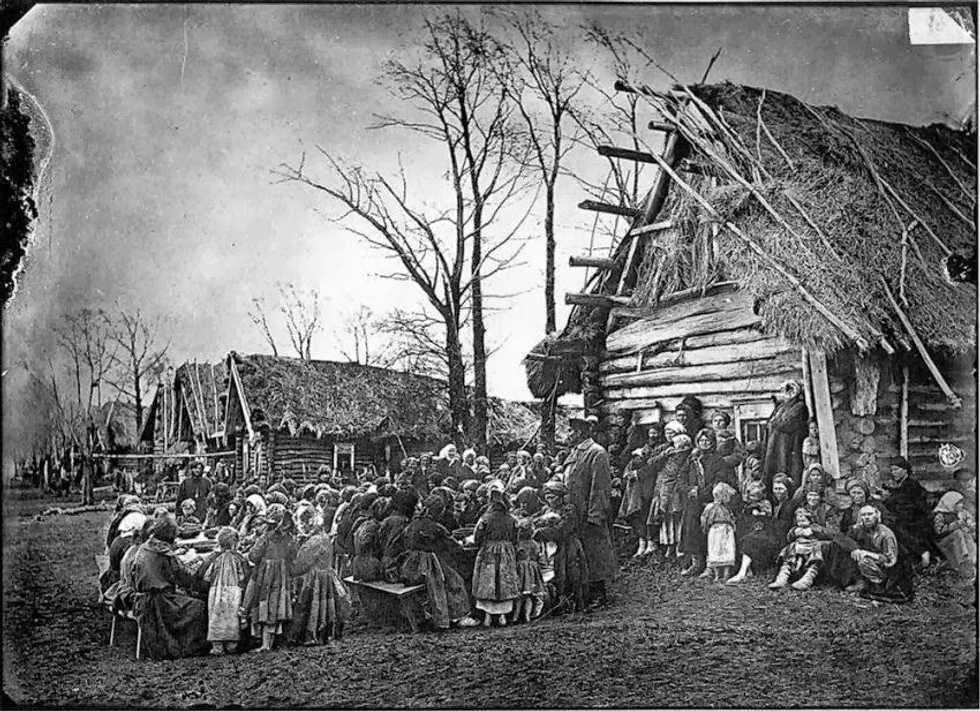(Just a heads up this is the book I'm looking at, you'll have to download it and I reccomend a quick peek, though it's not for the faint ofheart)
Village Life In Tsarist Russia by Olga Semyonova is a recount of peasants brought to life through writing from the heart of the slavic country side. Her four year study of peasant life was written by her and later edited by the historian David Ransel, and translated to english by Michael Lavine. Olga herself is in the thick of it all, bringing forth a visceral, true to life re-telling of the lower classes’s daily lives, along with a sprinkle of ongoing narration. Her writing provides a snapshot of the business of Russian peasantry from the years of 1898 to 1902. She goes into special detail on subjects such as marriage rites and early life, their housing environment, their economy and how they were governed--a chapter on each more or less.
Olga undertook this task to shed light on the history of poor slavs, as well as provide a modern take on people who at the time were firmly stuck in the past. Her recounts spare none of the gorey details-laying them neatly out before her horrified western audience. She touched upon truly every aspect of peasantry life; The wife-beating and heavy alcohol abuse, the numerous first-hand accounts of infanticide, how the men abused the women who in turn abused the children who in turn abused each other and whatever animals they could tear into. This was all brought forth in a salacious and judgemental manner of course from the author herself, but she does have a huge point in revealing the worms that lie under the mosaic stone of Russia’s history.
In a way her writing is scientific - taking observations and writing them down for posterity's sake. However, she weaves in with with flashes of her true feelings. When remarking with biological accuracy on the types of diseases that peasants get, she states, “(...) ‘assaulted by thirst’, as the peasants say, they cannot seem to get enough to drink and will take water from any source available. They drink from a roadside ditch, from a muddy puddle, from a swamp, wherever they can find some water to quench their thirst. Tapeworms and roundworms are common among peasants.” Super dry and precise scientific writing comes with an onslaught of personal detail after detail. In an effort to take everything down her own opinions come through in the work. It’s a faux-science, as she’s not just seeking and jotting down raw data. The unnecessary details and tone come through the page and attack the reader directly, giving us an unbridled and messy (but true) description.
Personal conflicting opinions arise when reading Olga’s book. A mixed bag of emotions spring up when people come to the defense of the idea, “Stop making white people jokes”. On one hand, yes, white and slavic people have seen their shares of suffering in history and (a few of them) are not the direct cause of the world’s problems today. On the other hand, white people have had this intense scrutiny coming for a long time. Her eyewitness account only goes to show that white and slavic people are guilty of the same crimes they accuse people of color of, only they’re better at hiding their flaws way out in the wild Russian countryside. Horrifying details pierce the thin veil of white innocence. Olga takes a flashlight to what’s been swept under Russia’s rug.
Village life was an eye-opening experience. White stereotypes become true as people fail to look back to their own history and shudder to think that yes, their ancestors were like that. Cyclical history arises when people can’t face the fact that their great-grandmothers and fathers dwelled and abided by the rules of the past. Olga tore the lid off of pandora’s box and was herself afraid that they would continue to behave this way, in the slow-progressing way that humans have carved over time. She expresses her doubts through the quote, “(...) Another thought that bothers me is how can we [the bourgeois/upper class], the targets of the people’s hatred, alter their goals, open new horizons to them, implant the notion of intensive labor (progress) as a source of well-being? They would not believe us and would simply laugh at us, perhaps justifiably.” Subconsciously wanting to be the caretaker of the lower class, much like the relationship between Tsar (‘Little Father’) and peasant, she touches upon the point that ideals are difficult to change once they’ve been established. Once people are forced to see through another’s eyes that they’re just like everyone else, something breaks down. They try to hide their past failures and shames as a race by domineering and writing history as they see best fit. It’s a small wonder that I haven’t read this book before now.
It’s exceptionally easy to absorb and project the angry attitude that is prevalent throughout Olga’s writing. Her justified rage for all generations of Russian peasantry comes through most clearly in the quote, “Among the reasons for [infanticide] are shame, fear, and finances. (...) Older women are very ruthless and cold blooded about killing of an illegitimate [child]. Young women anguish over such a decision and force themselves to kill their babies only when shame or fear causes them to lose their senses (...) Men, from what I could observe, often simply do not know about such killings (...) and often look the other way.” The scathing writing is infectious because it calls to attention the atrocities that happened universally due to the archaic conditions human morals dwelled in. She wants to focus 90% of her energy on harshly critiquing the peasant’s lifestyle, and the other 10% on hard historical data. This doesn't make for a super accurate reading of populaces or dates, but it does give a window to the social aspect of Russian history and how outsiders and insiders alike viewed them. Now this is only a theory, but Olga may have had a lot more to say had maybe she herself done the editing. Again this is only a theory, as there’s no evidence currently from Mr. Ransnel to support this.
Olga could have given the world a dull and completely factual tale of life in Russia’s black land belt, but she gave us something so much more. So much more to oggle, to critique, to reflect upon as a species. A brilliant read even if disturbing and highly opinionated.




















